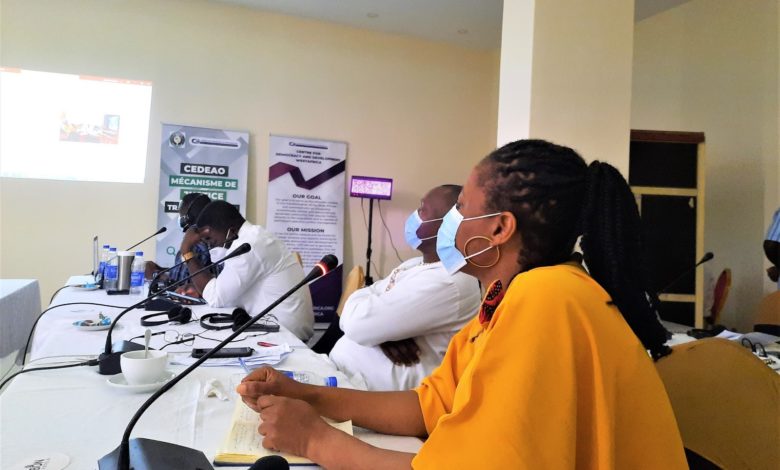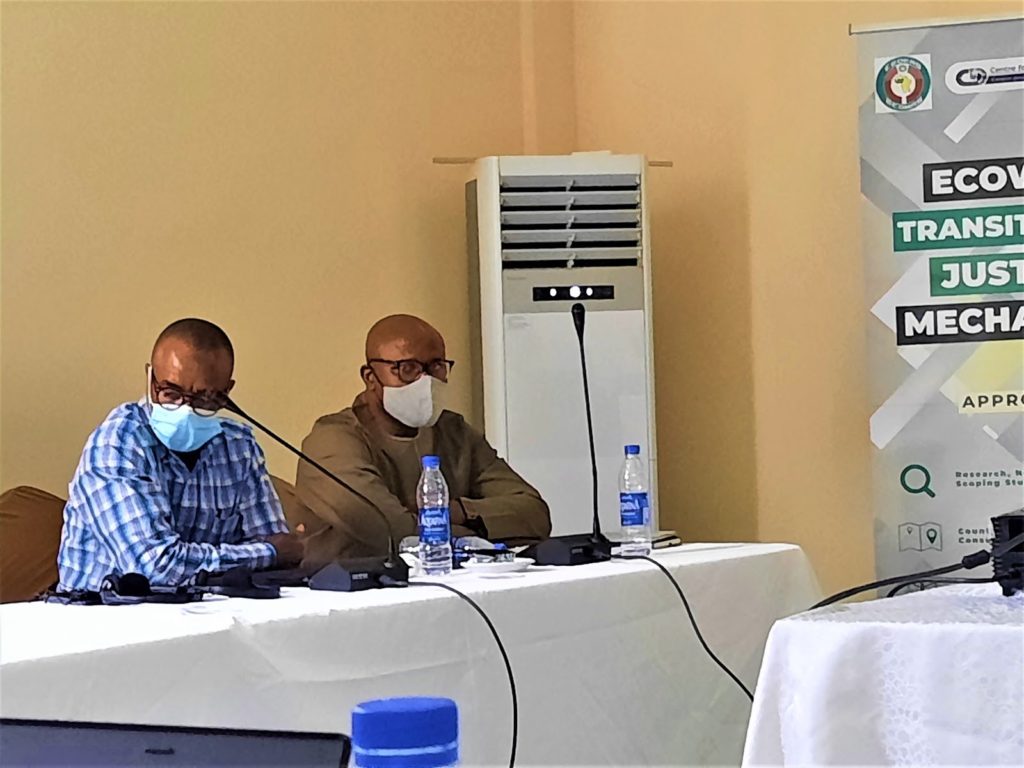Unravelling The Place Of Journalists In West Africa’s Transitional Justice Processes

Twelve media practitioners and human rights experts converged in Lagos to rub minds on how to strengthen the role of newsrooms in Transitional Justice (TJ) processes in West Africa. Others who could not make it to the Nigerian megacity joined through video conferencing.
The consultative meeting, which was held on December 28 and 29, 2020, involved the participation of stakeholders from 11 of the 15 ECOWAS (Economic Community of West African States) member-countries.
The aim of the meeting, organised by the Centre for Democracy and Development (CDD) with support from ECOWAS, was to develop a transitional justice policy framework for the ECOWAS sub-region.
Such frameworks are still new to a lot of African countries despite the prevalence of armed conflict. The African Union Transitional Justice Policy (AUTJP) was adopted as recently as February 2019. In contrast, the European Union adopted its TJ policy framework in 2015 and the United States has had a TJ policy paper series since 2016.
A separate framework for West African countries would help to capture the unique traits of conflict and transitional justice in the region.
CDD Director Idayat Hassan observed during her opening remark that it was especially needed in countries such as Burkina Faso, Mali, Niger and Nigeria with ongoing insurgencies, and others such as Liberia and Sierra Leone with unaddressed histories of violence.
“The outcome of this consultation will form part of the components of the ECOWAS handbook. We want to make it as participatory as possible and to capture the interests of all stakeholders,” she explained.
Transitional justice has been adopted in different countries across West Africa to address large-scale abuses of human rights.
In Nigeria, for instance, the Human Rights Violations Investigation Commission (better known as the Oputa Panel) was set up in 1999 to investigate gross human rights violations under military governments from 1966.
Similarly, in Liberia, the Truth and Reconciliation Commission (TRC) was created in 2005 to investigate over two decades of civil conflict, report gross rights violations, and identify culprits.
In The Gambia, the Truth, Reconciliation and Reparations Commission (TRRC) was recently established by the parliament to document human rights abuses under the presidency of Yahya Jammeh, promote healing and reconciliation, and consider reparations for victims.
But these TJ measures have faced various challenges from the refusal of the government to publicise the findings of the commissions to failure to act on their recommendations.
Even though the Oputa Panel concluded its work and submitted a report to the Federal Government in 2002, the government has neither acted on its findings nor officially made the report public. Similar government inaction has drawn criticisms in Liberia, where the TRC released its final report in 2009.
“There are no accountability mechanisms in place in Liberia to hold human rights violators liable as aligned in the country’s TRC process,” observed Malcolm Joseph, Executive Director of Center for Media Studies and Peacebuilding (CEMESP) in Liberia.
The Togolese Truth, Justice, and Reconciliation Commission (CVJR) and the Ghanaian National Reconciliation Commission (NRC) have likewise been blamed for not taking into account all the pillars of transitional justice.

According to Sonny Onyegbula, lawyer and human rights officer at the United Nations, the media is especially important because of its ability to shape discourse, ideas, and narratives.
“The Oputa Commission gained traction because of the live coverage given by broadcast media. It helped shape the understanding of Nigerians on what was going on and past events,” he pointed out.
One reason many transitional justice reports are not taken seriously by governments is the poor reportage from journalists, Onyegbula said. Agreeing, Joseph added that media organisations could mount pressure on state authorities to implement the outcomes of TJ processes.
“Quite unfortunately, Liberians are toeing the attitude of letting bygones be bygones. But since we initiated the process, we need to get to the bottom of it. The media can play a crucial role by beginning to galvanise public interest and support,” he said.
Besides these, journalists could help to kickstart the healing process for many victims by listening intently as they share their traumatic experiences.
“It is always important for people to vent, and this is where journalists come in – the creation of channels for people to vent and allow their voices be heard. We must give them ample time and let them be interviewed in their own settings and in the language they are comfortable in. We should open our channels and allow people to speak up,” said Solomon Cobbinah, a journalist with Ghana’s Joy News, capturing this point.
Professor Mala Mustapha, Head of the Department of Political Science at the University of Maiduguri, added that the media could also serve as a watchdog monitoring TJ processes, documenting past events, and getting justice for victims.
Having recognised the importance of the media in getting countries to adopt transitional justice mechanisms, participants at the consultative meeting highlighted how the industry could achieve this. Mame Lika Sidibé, a journalist with Seneplus Media in Senegal, started by recommending capacity-building for journalists.
“We cannot talk about issues of transitional justice if there is no proper training in this area. We have journalists who deal with issues of human rights, but in the media we need to be specialised,” she explained.
Onyegbula added that top media executives could be persuaded to organise training opportunities for their employees if their attention were drawn to human rights issues.
“The media should be charged with the responsibility of driving the process of accountability, educating the public about their roles in implementing the TRC report, the role of the government and so on,” chipped in Joseph.
“The report of the TRC is just there on the shelf; many people do not even know what the contents are. So the media has a lot to do. We need to get a sustained buy-in of the media for issues of accountability and public service,” he said.
He, however, added that for media professionals to do this, they themselves need to understand the issues.
Summarising some of the recommendations, Cobbinah said: “We should listen to all the sides of the story. We should avoid sensationalism. Reports should be based on facts and not opinions.
“We should continue to crosscheck so we get the right information. We should treat all victims with human dignity; it should not just be about ratings and getting viewers. We should make our job about pushing for accountability.”
“When does the media stop reporting?” Oyegbula asked rhetorically. “The simple answer is when justice is served.”
The stakeholders recognised that there were huge financial limitations in the way of these solutions. In Liberia, for example, Joseph said, newspapers only sold about 500 to 600 copies a day and so depended on adverts to stay above water. And who are those placing these expensive adverts? Politicians.
“Survival is therefore a greater priority for them than issues like this,” he concluded.
Weighing in, Seth Kwame Boateng, a senior journalist with Ghana-based Joy News, said his media organisation does not rely on politicians despite running three television and five radio channels. The secret, he suggested, was in the quality of its reports and the trust the public had in the company’s independence, which have influenced them to patronise it despite expensive advert rates.
Rounding up the two-day event, CDD boss Hassan noted that the deliberations showed there was more work to be done when it comes to the role of the media in peace-building and strengthening transitional justice mechanisms.
She assured that the recommendations would be shared with the Centre’s partners, who can take additional steps in ensuring they are implemented.
“We do hope we will continue to work together. We have learnt new ideas. We have identified new partners and new opportunities, which I hope we can together take to the next level,” she added.
Support Our Journalism
There are millions of ordinary people affected by conflict in Africa whose stories are missing in the mainstream media. HumAngle is determined to tell those challenging and under-reported stories, hoping that the people impacted by these conflicts will find the safety and security they deserve.
To ensure that we continue to provide public service coverage, we have a small favour to ask you. We want you to be part of our journalistic endeavour by contributing a token to us.
Your donation will further promote a robust, free, and independent media.
Donate HereStay Closer To The Stories That Matter




